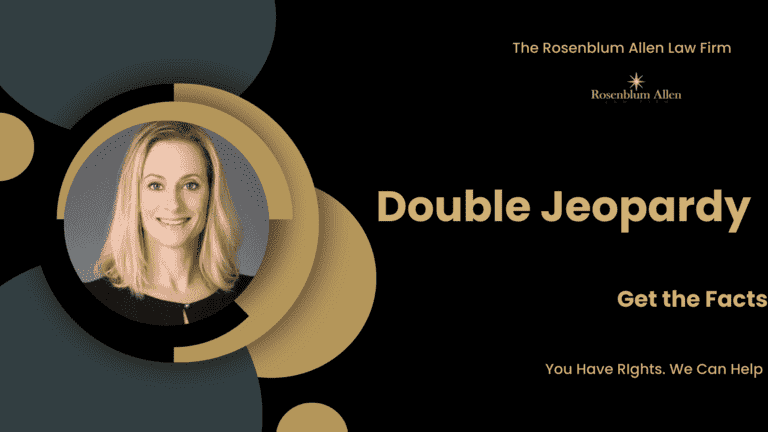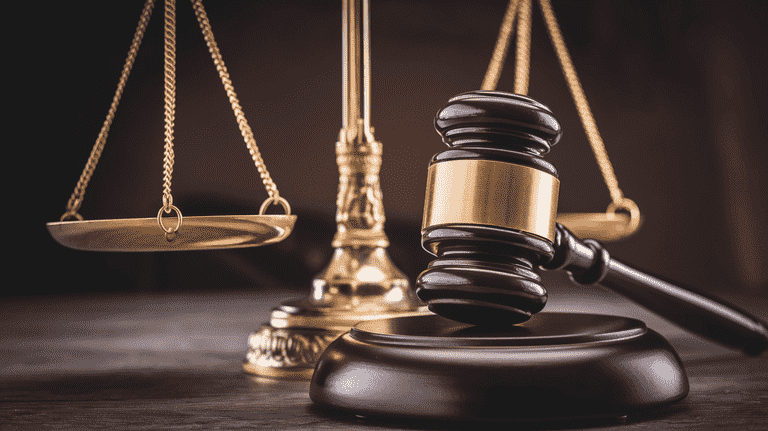Double jeopardy is an important legal concept. It protects individuals from being tried twice for the same offense. This principle is crucial in ensuring fair treatment in the justice system. Understanding double jeopardy is essential, especially if facing legal challenges in Nevada.

Double Jeopardy Basics
Definition of Double Jeopardy
Double jeopardy means you can’t be prosecuted more than once for the same crime. Once acquitted or convicted, you’re protected from further prosecution on the exact charges.
Historical Background and Constitutional Basis
The concept of double jeopardy has deep roots. It’s enshrined in the Fifth Amendment of the U.S. Constitution. Here’s a quick look at its origins:
- Ancient Roots: Traced back to Greek and Roman law.
- English Common Law: Influenced the American legal system.
- U.S. Constitution: The Fifth Amendment explicitly states, “No person shall … be subject for the same offense to be twice put in jeopardy of life or limb.”
Double Jeopardy in Nevada
Overview of Nevada’s Legal Stance on Double Jeopardy
Nevada upholds the principle of double jeopardy. The state has specific statutes mirroring federal protections, ensuring residents are not unfairly prosecuted multiple times for the same act.
Key Statutes and Legal Precedents in Nevada
Nevada law includes provisions that reinforce double jeopardy protections. Some key points include:
- Statutory Protections: Nevada Revised Statutes (NRS) provide guidelines.
- Case Law: Several Nevada cases have set precedents, further clarifying how double jeopardy is applied in the state.
This foundation helps ensure fairness and integrity in legal proceedings. Understanding these laws can be crucial if you’re navigating the legal system.

When Double Jeopardy Applies
Criminal vs. Civil Cases
Double jeopardy primarily applies to criminal cases. It protects against multiple prosecutions for the same offense. However, it does not apply to civil cases. Here’s a simple breakdown:
- Criminal Cases: Protected under double jeopardy.
- Civil Cases: Not protected; a person can face criminal prosecution and civil lawsuits for the same act.
Examples of Cases Where Double Jeopardy Is Applicable
Consider these scenarios:
- Acquittal: If you’re acquitted of a crime, you can’t be tried again for the same crime.
- Conviction: You can’t be retried for the same offense once convicted.
- Mistrial: Generally, a mistrial does not invoke double jeopardy protections, allowing for a retrial.
Understanding these nuances helps clarify when double jeopardy applies.
Exceptions and Limitations
Circumstances Where Double Jeopardy Might Not Apply
Even with strong protections, there are exceptions. Here’s when double jeopardy might not shield you:
Mistrials and Hung Juries
- Mistrials: A retrial may occur if a trial ends without a verdict.
- Hung Juries: When a jury can’t reach a unanimous decision, a retrial is possible.
Appeals and Retrials
- Appeals: You might face a retrial if you appeal a conviction and win.
- New Evidence: Exceptional cases where new, compelling evidence emerges might reopen the case.
Federal vs. State Charges
Double jeopardy does not prevent separate prosecutions by different sovereigns. This is known as the “dual sovereignty” doctrine:
- Federal vs. State: You can be tried by state and federal courts for the same act if it violates state and federal laws.
These exceptions and limitations highlight the complexity of double jeopardy. Understanding them ensures you’re better prepared to navigate potential legal challenges.
Legal Process and Double Jeopardy
How Double Jeopardy Claims Are Raised in Court
Raising a double jeopardy claim involves a few key steps:
- Filing a Motion: Your attorney files a dismissal motion based on double jeopardy.
- Hearing: The court holds a hearing to consider the motion.
- Judge’s Decision: The judge decides whether the claim is valid and whether to dismiss the charges.
It’s a strategic move, and having a skilled attorney is crucial.
Role of Defense Attorneys in Double Jeopardy Cases
Defense attorneys play a vital role:
- Legal Expertise: They understand the intricacies of double jeopardy laws.
- Strategy Development: They develop strategies to raise and argue the claim effectively.
- Representation: They represent you in court, ensuring your rights are protected.
A knowledgeable attorney can make a significant difference in these cases.

Implications of Double Jeopardy
Legal and Personal Implications for Defendants
Double jeopardy offers essential protections, but it also comes with implications:
- Legal Security: Once acquitted or convicted, you are protected from further prosecution on the exact charges.
- Peace of Mind: Knowing you can’t be tried again for the same crime provides relief.
However, navigating the system can be complex, and misunderstandings can arise.
Impact on Victims and the Justice System
The principle of double jeopardy also impacts victims and the broader justice system:
- Closure: It can mean closure for victims, knowing the case won’t be reopened.
- System Integrity: It upholds the justice system’s integrity, preventing abuse of power.
Balancing these interests is crucial for maintaining fairness and justice for all parties involved.
Seeking Legal Help
Importance of Hiring a Knowledgeable Defense Attorney
Navigating double jeopardy claims can be tricky. Here’s why hiring an experienced attorney is crucial:
- Expert Guidance: They provide specialist advice tailored to your case.
- Strategic Defense: Crafting a solid defense strategy is vital.
- Rights Protection: Ensures your legal rights are upheld throughout the process.
Choosing the right attorney can significantly impact the outcome of your case.
How The Rosenblum Allen Law Firm Can Assist with Double Jeopardy Cases
At The Rosenblum Allen Law Firm, we’re here to help:
- Experienced Team: Our attorneys have extensive experience with double jeopardy cases.
- Personalized Approach: We tailor our strategies to meet your unique needs.
- Proven Success: Our track record speaks for itself, with numerous successful defenses.
We’re committed to providing the support and expertise you need to navigate complex legal challenges. Let us help you understand and assert your rights.
Why You Have Not Hired a Felony Defense Attorney Yet
Watch this short video to take the next big step toward defending your rights against a felony charge.

Breaking It All Down
Double jeopardy is a vital protection in Nevada’s legal system. It ensures individuals aren’t prosecuted multiple times for the same offense, safeguarding fairness and justice.
Here’s a quick recap:
- Critical Protections: Prevents repeated prosecutions after acquittal or conviction.
- Complex Exceptions: Includes mistrials, appeals, and dual sovereignty.
- Legal Support: It is essential to have a skilled attorney to navigate these issues.
Understanding double jeopardy helps you better navigate potential legal challenges. If you’re facing legal issues, know that help is available. The Rosenblum Allen Law Firm is here to guide you every step of the way. Let’s ensure your rights are protected and justice is served.

Frequently Asked Questions
What exactly is double jeopardy?
Double jeopardy occurs when an individual is prosecuted by the same government for the same offense twice. This includes scenarios like retrials after a mistrial, appeals following an acquittal and retrial, or separate prosecutions by the same authority.
What situations do not fall under double jeopardy?
Double jeopardy does not apply in cases where different governments prosecute the individual, the prosecution is for a different crime, the defendant consents to a retrial after a mistrial, or a conviction is overturned on appeal, leading to a retrial.
Can someone face charges twice for the same offense?
Generally, no. According to double jeopardy, the same prosecuting authority cannot charge an individual twice for the same crime. However, exceptions exist, such as facing the same charges again after a mistrial. Additionally, both federal and state governments can prosecute for the same act.
How can a double jeopardy defense be raised?
If you believe being tried or sentenced twice for the same crime violates double jeopardy, you or your lawyer can file a pretrial motion to dismiss on these grounds. Your lawyer may also object during the trial if you’re prosecuted again for the same offense.
Does double jeopardy apply across state lines?
Yes, the Fourteenth Amendment extends double jeopardy protection across state lines. Prosecution for a crime by one state prevents later prosecution by another state. However, a prior federal or foreign prosecution does not prevent a state from prosecuting for the same act under dual sovereignty.

Glossary
Double jeopardy – The prosecution of a defendant for a crime they’ve already been prosecuted for. The Fifth Amendment prohibits this at the federal level, and the Fourteenth Amendment prohibits it at the state level.
Dual sovereignty – The principle allows federal and state governments to prosecute someone for the same criminal act. This is an exception to double jeopardy protections.
Mistrial – A trial ending inconclusively because the jury can’t agree on a verdict, a severe procedural error, or some other significant problem arises. After a mistrial, the defendant may face the exact charges again in a retrial.
Retrial – A new trial ordered upon appeal of a case after the original trial ended in a mistrial, acquittal, or overturned conviction. Retrials can raise double jeopardy issues.
Acquittal – A not guilty verdict by a judge or jury that absolves the defendant of criminal liability for the charged offenses. An acquittal typically prevents retrial on the exact charges due to double jeopardy.
Appeal – A procedure allowing a higher court to review a lower court’s rulings and verdicts. If errors are found, a criminal conviction can be reversed or overturned on appeal.
Pretrial motion – Motions filed by the defense or prosecution before a criminal trial begins. They can address evidentiary issues, request the suppression of evidence, or seek dismissal of charges.
Sovereign – In the double jeopardy context, the prosecuting governmental authority – either the federal government or an individual state government.

Additional Resources for You
We would like to remind our readers that our lead attorney, Molly Rosenblum Allen, Esq, has diligently created a range of comprehensive resources to assist you in your time of need. These valuable resources cover crucial legal topics and offer in-depth insights into various legal scenarios. Below are some of the resources that might be incredibly helpful:
Hung Jury: An informative resource discussing what constitutes a hung jury, its consequences, and how it affects a legal case. Learn more
Circumstantial Evidence: A comprehensive overview of circumstantial evidence, how it differs from direct evidence, and its significance in the court of law. Read further
Indicted vs Charged: An insightful comparison detailing the differences between being indicted and being charged, and what each term means for the accused. Understand the differences
Difference Between Jail and Prison: A clear and concise explanation outlining the distinctions between jail and prison, a common area of confusion. Clarify your understanding
What are Miranda Rights: An essential guide on Miranda Rights, their importance, and how they protect individuals during police interrogations. Know your rights
How to Check if You Have an Outstanding Warrant: A useful resource providing a step-by-step guide on how to check for outstanding warrants against your name. Check your status
What to Look for in a Criminal Defense Lawyer: Valuable insights into selecting the right criminal defense lawyer, highlighting the key qualities and factors to consider. Make an informed decision
Possible Ways to Reduce a Felony Charge: A strategic guide discussing various approaches and legal maneuvers that could potentially reduce a felony charge. Explore your options
Should You Accept a Plea Bargain: An in-depth analysis examining the pros and cons of accepting a plea bargain, helping you to make a well-informed decision. Weigh your choices
Molly Rosenblum Allen, Esq, is committed to providing accessible and reliable legal information to empower and educate. We encourage you to utilize these resources to gain a better understanding of your legal circumstances and options.

Offsite Resources You May Find Helpful
Here are some offsite resources that may add value to the content above:
Legal Information Institute – Double Jeopardy: This page from Cornell Law School’s Legal Information Institute provides a comprehensive overview of the concept of double jeopardy, its constitutional basis, and its role in the United States legal system.
FindLaw – Double Jeopardy: FindLaw, a trusted source of legal information, provides a detailed explanation of double jeopardy, its exceptions, and related legal principles.
- National Association of Criminal Defense Lawyers – Double Jeopardy: This article by the National Association of Criminal Defense Lawyers (NACDL) presents a simplified explanation of the double jeopardy law, its application, and its exceptions.
JSTOR – Double Jeopardy Law: This scholarly article from the Columbia Law Review on JSTOR provides a deep dive into the legal and historical context of double jeopardy. Although it is a bit more academic, it may be of interest to those looking for a more in-depth understanding of the topic.

A Special Message from Our Lead Attorney

Molly Rosenblum, Esq
Dear Reader,
Thank you for reviewing the resources I created to help those needing legal guidance.
I hope they have been valuable in providing information and understanding the legal landscape.
If you or someone you know needs legal counsel, please reach out to schedule a free consultation with me and my team.
We are committed to protecting our client’s rights and ensuring they receive solid legal representation.
Call us at (702) 433-2889 to schedule a free consultation.
I look forward to offering effective legal advice tailored to your situation.
Sincerely,
Molly Rosenblum, Esq.




